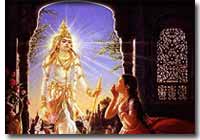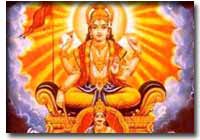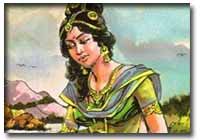SON OF THE SUN GOD
 |

The princesses ignored the presence of the old warrior. In the svayamvara the choice of the princesses counted normally. However according to the kshatriya tradition prevalent in those days, an outstanding warrior of an extraordinary valour may choose to carry away the prize, ofcourse after an open challenge for trial of strenghth. It was called as tha raksha type of marriage and the heroic way was accepted by the kshatriyas. However it was a very rare occurrence as no warrior, however brave he might be seldom dared to face singularly the combined wrath of the all the princes present. However Bhishma chose the extraordinary method and openly challenged the princes for a fight. Nobody dared to fight the veteran warrior and Bhishma placed the three princes in the chariot but announced publicly that he was taking the brides to be married to his brother Vichitravirya. Thus he set towards his destination, Hastinapura.
When he was on his way Salva the king of Saubala who was attached to Amba attacked Bhishma. After a fierce fight Bhishma could overpower the king of Saubala but spared his life at the specific request of the princesses. When brisk preparations for the marriage function were on the way, princesses Amba came to Bhishma and said, " O best of the Bharatha race, I fell in love with Salva. I would have fastened the floral garland around his neck the other day in the svayamvara function but for your brave intervention. You are credited with the knowledge of Dharma and known for your nobility. I request that you may be pleased to choose the correct course of action." Bhishma then decided that it is not right to get a girl married who already had a liking towards another man. Bhishma valued her thoughts and decided the next step to be proceeded.

Bhishma requested Vichitravirya to marry Amba but he refused begging pardon of his esteemed brother for his inability to take a girl who mentally married someone else as his wife. Bhishma was in a dilemma and in great confusion and then he decided to talk to Amba. Bhishma conveyed his helpless pity to Amba who found herself in the most ridiculous situation. As her last approach she said, " worthiest warrior of Bharathavarsha as well as the Bharatha race, you have won me by valour so you have acquired the best claim on me. As a chivalrous Kshatriya it is your duty now to marry me. When Amba put forth this message Bhishma did not know how to react for the situation. In fact there is no other course." Bhishma brushed aside the proposal quite contemptuously but suggested to Amba to go to Salva a second time and try her luck. Amba stayed at Hastinapura for some time and in utter desperation went to Salva once again. But he reiterated his earlier stand and refused to marry her. Amba in spite of her beauty and accomplishments found her life ruined and thought that Bhishma was the root cause for all her misery.
The deepest desire to wreak vengeance on Bhishma sprouted in her baffled mind and she approached warrior after warrior in Bharathavarsha to champion her cause. But nobody came forward to oppose Bhishma. Then she performed in adoration of Lord Subramanya who manifested himself before her and presented her with a garland, wearing which anybody would turn out to be an inveterate foe of Bhishma. Only after getting this wish from Lord Subramanya Amba was kind of consoled. She went to King of Drupada the traditional enemy of the Kauravas to offer the garland to him. But he refused it. Amba however deposited the garland at the gate of the royal fort and departed to the woods where she met some ascetics. They advised her to seek the aid of Parasurama. Amba approached him and narrated her sad story. Parasurama offered to ask Salva to marry her but she insisted that Bhishma must be punished.

But Amba still burning with revenge went to the Himalayas where she performed penance and obtained the grace of Shiva. Shiva granted her the boon that she would kill Bhishma in her next birth. But as she was eager for revenge she immolated herself over a pyre prepared by her and her soul was hovering over in search of rebirth for revenge. Vichitravirya met with premature death owing to overindulgence, leaving Ambika and Ambalika childless. Queen Sathyavati married the old King Santanu with the fond hope that the children born to her would rule Bharatavarsha. But her children died while she was alive reducing her to the position of a disappointed and debilitated widow. That was the irony of human hopes. As her dreams lay completely shattered on the ground before her own eyes, she summoned Bhishma and asked him to get married and beget children for the sake of keeping the royal genealogical tree alive.
The same source which in the recent historic past vehemently extracted the vow of life long celibacy from him was now abjectly soliciting that he should get married for the sake of continuity of the family line. But Bhishma remained true to his celebrated epithet, reiterated to the queen mother Sathyavati his resolve to stand by his firm vow forever. As a last resort Sathyavati thought of Veda Vyasa, the first son born to her by a great sage Parasara when she was a virgin. She recollected very often how she, emitting a fishy smell out of her body, was instantaneously transformed by the grace of Parasara into a girl of fragrant glamour permeating the atmosphere with perfume within the radius of eight miles. Now all that was past a history. Veda Vyasa manifested himself before his mother Sathayavati and he, the walking encyclopedia of Vedic erudition, shining like a mountain made of blue diamonds with golden tresses of hair, bowed to her feet and awaited her command.

